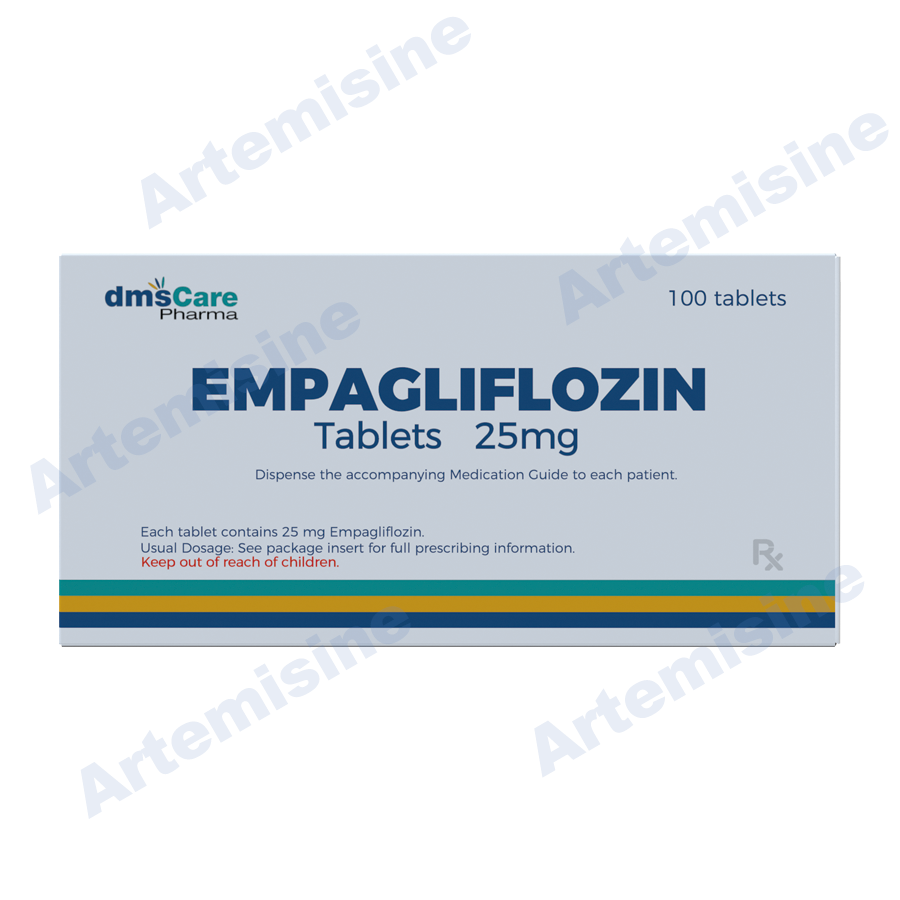Product Description
Products name:
Empagliflozin Tablets 25mg
Contact:
Empagliflozin 25mg each tablet
Package:
100 tablets/ box
What is empagliflozin?
Empagliflozin is used together with diet and exercise to lower blood sugar levels in adults and children at least 10 years old with type 2 diabetes.
Empagliflozin is also used to lower the risk of death from heart attack, stroke, or heart failure in adults with type 2 diabetes who also have heart disease.
Empagliflozin is also used in adults to lower the risk of dying or needing to be in a hospital for heart failure when the heart cannot pump blood properly.
Empagliflozin is not for treating type 1 diabetes.
Empagliflozin may also be used for purposes not listed in this medication guide.
Empagliflozin side effects
Get emergency medical help if you have signs of an allergic reaction: hives, difficult breathing, swelling of your face, lips, tongue, or throat.
Seek medical attention right away if you have signs of a serious genital infection (penis or vagina): burning, itching, odor, discharge, pain, tenderness, redness or swelling of the genital or rectal area, fever, not feeling well. These symptoms may get worse quickly.
Empagliflozin may cause serious side effects. Call your doctor at once if you have:
- a light-headed feeling, like you might pass out;
- low blood sugar–headache, hunger, weakness, sweating, confusion, irritability, dizziness, fast heart rate, or feeling jittery;
- dehydration–dizziness, confusion, feeling very thirsty, less urination;
- ketoacidosis (too much acid in the blood)–nausea, vomiting, stomach pain, confusion, unusual drowsiness, or trouble breathing; or
- signs of a bladder infection–pain or burning when you urinate, blood in your urine, pain in pelvis or back.
Common side effects of empagliflozin may include:
-
- a bladder infection; or
- yeast infection in women (vaginal itching or discharge).
Before taking this medicine
You should not use empagliflozin if you are allergic to it, or if you have:
- severe kidney disease (or if you are on dialysis).
Tell your doctor if you have or have ever had:
- a bladder infection or urination problems;
- a genital infection (penis or vagina);
- problems with your pancreas, including surgery;
- alcoholism, or if you currently drink large amounts of alcohol;
- if you are on a low salt diet, you are eating less, or there is a change in your diet;
- if you are 65 or older; or
- liver or kidney disease.
Follow your doctor’s instructions about using empagliflozin if you are pregnant or you become pregnant. Controlling diabetes is very important during pregnancy.
You should not use empagliflozin during the second or third trimester of pregnancy.
Do not breastfeed.
How should I take empagliflozin?
Follow all directions on your prescription label and read all medication guides or instruction sheets. Your doctor may occasionally change your dose. Use the medicine exactly as directed.
Take empagliflozin once a day in the morning, with or without food.
Your blood sugar will need to be checked often, and you may also need to test the level of ketones in your urine. Empagliflozin can cause life-threatening ketoacidosis (too much acid in the blood). Even if your blood sugar is normal, contact your doctor if a urine test shows that you have high ketones in the urine.
Blood sugar can be affected by stress, illness, surgery, exercise, alcohol use, or skipping meals.
Low blood sugar (hypoglycemia) can make you feel very hungry, dizzy, irritable, or shaky. To quickly treat hypoglycemia, eat or drink hard candy, crackers, raisins, fruit juice, or non-diet soda. Your doctor may prescribe glucagon injection in case of severe hypoglycemia.
You may get dehydrated during prolonged illness. Call your doctor if you are sick with vomiting or diarrhea.
This medicine can affect the results of certain medical tests. Tell any doctor who treats you that you are using empagliflozin.
Your treatment may also include diet, exercise, weight control, and special medical care.
Tell your doctor if you have a planned surgery.
Store at room temperature away from moisture and heat.
